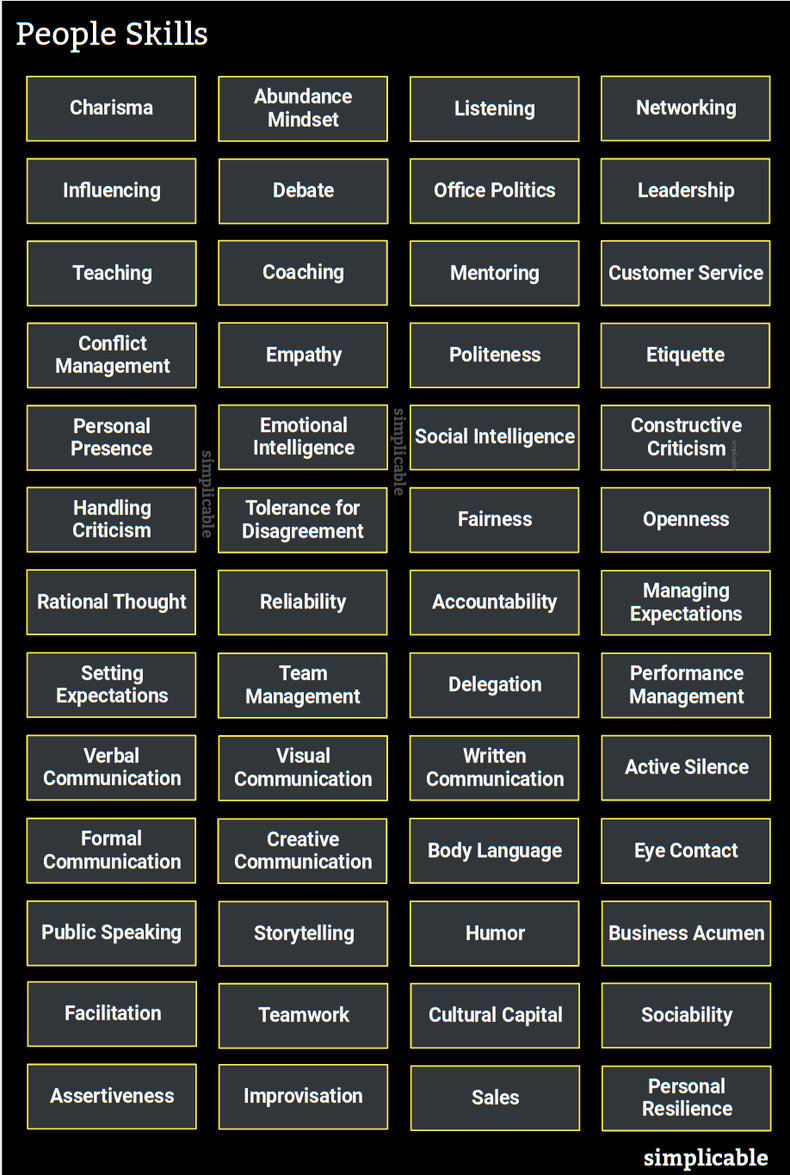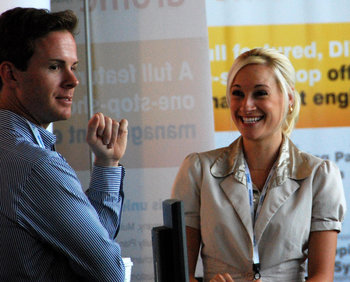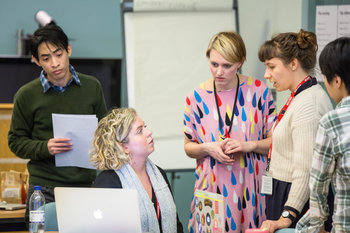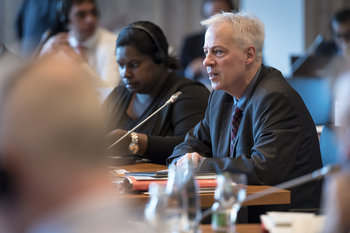

Charisma
The ability to be likable and/or socially dominant in a wide range of situations such that you inspire devotion in others.Abundance Mindset
The belief that there is enough for everyone such that you support others and are genuinely happy to see them succeed. This is associated with an ability to build large and loyal social connections based on win-win relationships.Listening
The ability to pay attention to people, process what they are saying and show that you are listening.Networking
Building new social connections.Influencing
The ability to change the ideas and actions of others with persuasion.Debate
A talent for representing a position in an argument.Office Politics
Navigating the politics of an organization to get things done.Leadership
Leadership is the process of getting groups moving in the same direction towards common objectives.Teaching
The ability to develop knowledge in others. Often referred to as training in a business context.Coaching
The process of helping others to improve their performance with techniques such as knowledge of performance and knowledge of results.Mentoring
A professional relationship whereby an experienced individual works to improve the performance of a less experience individual over time.Customer Service
The ability to provide professional and pleasant customer service.Conflict Management
Handling difficult social situations where emotions are running high such as an angry customer or coworker.Empathy
The ability to understand how others feel and to act in some appropriate way. For example, demonstrating sympathy with another's loss.Politeness
Demonstrating respect for others and complying with the norms of a society and situation.Etiquette
Knowledge of specific social rules and ability to apply these rules to make a good impression. For example, conforming to the expected dining etiquette of a culture.Personal Presence
A talent for signaling or countersignaling social strengths.Emotional Intelligence
The ability to read emotion in others and respond in an intelligent way. For example, being able to see that a customer is angry and work to solve the source of these feelings as opposed to responding to anger with anger.Social Intelligence
Social intelligence is the ability to navigate complex social situations such as competition for the same job within a team that relies on support from executives.Constructive Criticism
Delivering criticism in a timely and professional manner that isn't unnecessarily negative.Handling Criticism
Accepting fair criticism and defending yourself from unfair criticism in a professional and effective manner.Tolerance for Disagreement
The ability to work in an environment of intellectual diversity where disagreement is common.Fairness
Treating others with fairness. For example, judging others on the content of their character as opposed to their appearance or background.Openness
Openness to new ideas or the possibility that you might be wrong about something.Rational Thought
Thinking in a rational way including the discipline to identify your own biases and fallacies.Reliability
Managing commitments and delivering to gain a reputation for doing what you say you will do.Accountability
A willingness to answer to the success or failure of your actions, roles and responsibilities.Managing Expectations
Preventing people from imagining you're going to do things that aren't on your agenda.Setting Expectations
Making it clear why/what/when/where/how you expect things from others.Team Management
Managing others to set direction, control resources and achieve team objectives.Delegation
The ability to divide large problems into individual tasks and activities that are assigned to multiple individuals to increase productivity and manage your time.Performance Management
Setting performance expectations and managing performance against those expectations.Verbal Communication
Expressing yourself in conversation.Visual Communication
The ability to influence with pictures.Written Communication
Communicating with words such as an email.Active Silence
The use of silence as a tool of communication.Formal Communication
The ability to deliver formal communications that require a particular structure. For example, delivering a negative performance review that has legal implications.Creative Communication
Communication that requires creativity such as advertising.Body Language
Using your physical presence to improve communication. For example, looking as if you are energetic and listening.Eye Contact
Eye contact is an element of communication as people commonly try to read others by looking in their eyes.Public Speaking
Influencing and communicating to groups of more than ten people.Storytelling
The ability to make things interesting with a story as opposed to bland information or emotion.Humor
The ability to use the dark and absurd to make life strangely more pleasant.Business Acumen
Business acumen is knowledge of a business and ability to communicate convincingly in a business context. For example, the ability to influence in the telecom industry because you understand the business.Facilitation
Promoting communication, decision making and problem solving in a social process in which you hold no stake.Teamwork
Working productivity and cooperatively in a team. For example, supporting the ideas of others where they have value.Cultural Capital
Cultural capital is the ability to influence in the context of a culture. For example, the ability to influence the upper class of a particular society.Sociability
An enthusiasm for communicating and getting to know people.Assertiveness
A willingness to challenge others in social situations to achieve an objective or generally establish social dominance.Improvisation
Improvisation is the ability to creatively build on the ideas of others on the spot with no planning. For example, the ability to construct a collaborative solution to an outside context problem.Sales
Sales is largely considered a social process of building relationships, communicating a value proposition and closing sales.Personal Resilience
The ability to handle stresses without loss of performance, creativity and motivation. This is a people skill because social processes tend to be the most stressful elements of a job.| Overview: People Skills | ||
Type | ||
Definition | A collection of abilities that allow an individual to accomplish goals in a social environment. | |
Related Concepts | ||


























